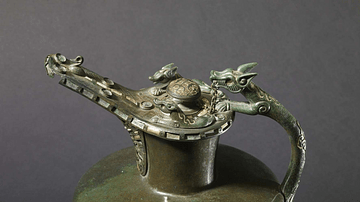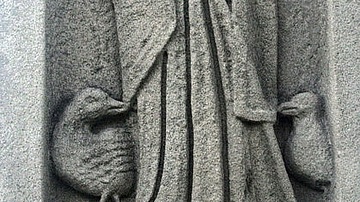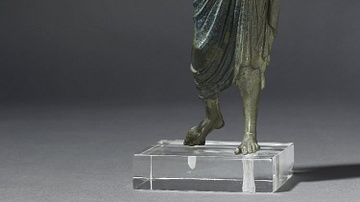Search
Search Results

Video
Ancient Celtic Religion, Druids and Funerary Beliefs
The Ancient Celtic religion was a polytheistic one, with numerous gods with sometimes overlapping responsibilities. The ancient Celts, who occupied parts of western and central Europe during the Late Bronze Age and through to the Iron Age...

Definition
Cernunnos - The Ancient Celtic Nature God
Cernunnos was an ancient Celtic god who represented nature, flora and fauna, and fertility. He is frequently depicted in Celtic art wearing stag antlers or horns and usually a torc around his neck. Few details are known about him but celebrated...

Article
Celtic Feasts
Feasts were an important part of ancient Celtic culture which marked important dates in the calendar and community successes. They were, too, an opportunity to display social status and, of course, eat and drink aplenty. Drunkenness and brawling...

Article
Ancient Israelite & Judean Religion
As early as the 10th century BCE, Israelite and Judean religion began to emerge within the broader West Semitic culture, otherwise known as Canaanite culture. Between the 10th century and 7th centuries BCE, ancient Israelite and Judean religion...

Definition
Hilda of Whitby
Hilda of Whitby (also known as Saint Hilda of Whitby, l. 614-680 CE) was the founder and abbess of the monastery at Whitby, Kingdom of Northumbria, Britain. She was a Northumbrian princess who converted to Christianity with the rest of the...

Definition
Ancient Persian Religion
Ancient Persian religion was a polytheistic faith which corresponds roughly to what is known today as ancient Persian mythology. It first developed in the region known as Greater Iran (the Caucasus, Central Asia, South Asia, and West Asia...

Definition
Roman Religion
In many societies, ancient and modern, religion has performed a major role in their development, and the Roman Empire was no different. From the beginning Roman religion was polytheistic. From an initial array of gods and spirits, Rome added...

Article
Religion in Ancient China
Religious practices in ancient China go back over 7,000 years. Long before the philosophical and spiritual teachings of Confucius and Lao-Tzu developed or before the teachings of the Buddha came to China, the people worshipped personifications...

Definition
Ancient Greek Religion
In the ancient Greek world, religion was personal, direct, and present in all areas of life. With formal rituals which included animal sacrifices and libations, myths to explain the origins of mankind and give the gods a human face, temples...

Definition
Etruscan Religion
The religion of the Etruscans, the civilization which flourished from the 8th to 3rd century BCE in central Italy, has, like many other features of the culture, long been overshadowed by that of its Greek contemporaries and Roman conquerors...